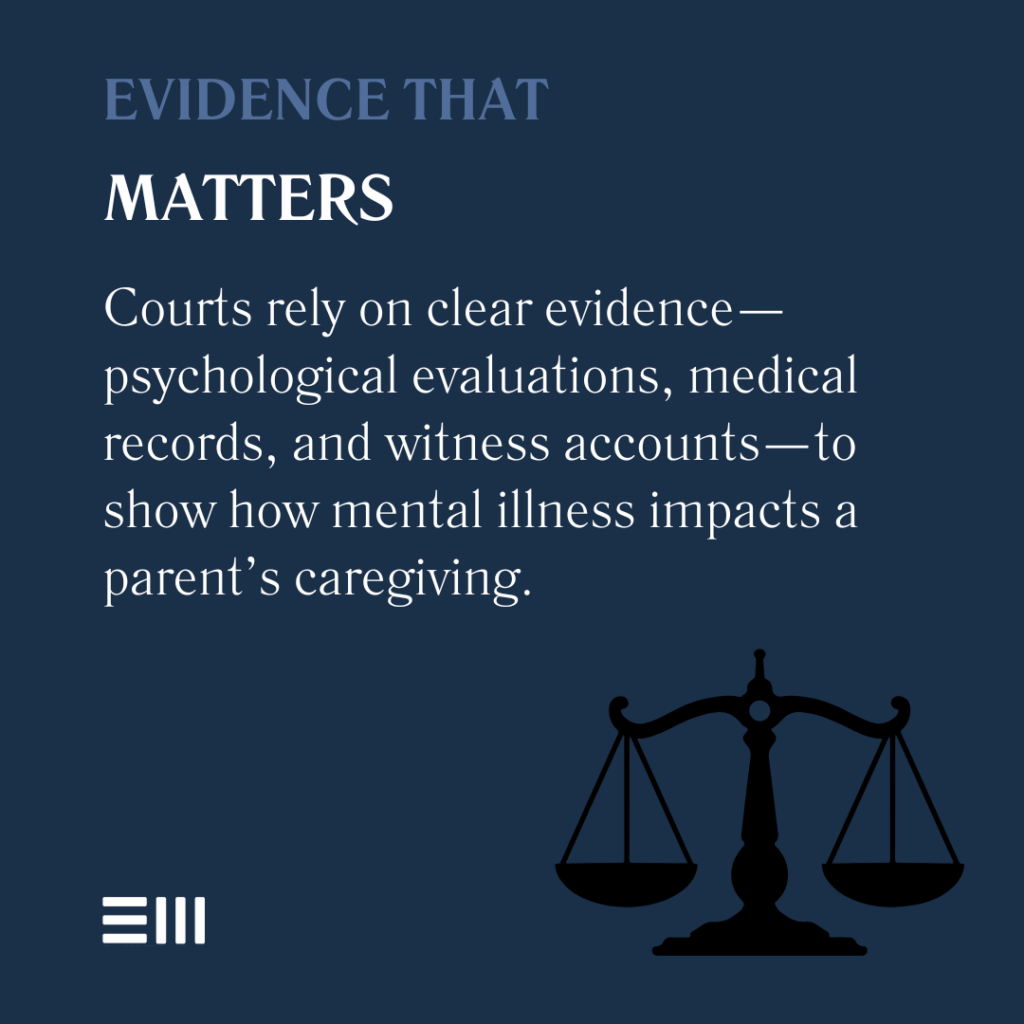
Alabama courts handle custody decisions guided by one unwavering principle: the best interests of the child.
Mental health concerns affecting a parent’s ability to provide safe, stable care can significantly impact custody outcomes.
Understanding how to prove mental illness in custody cases requires knowledge of Alabama’s legal standards, proper evidence collection, and strategic presentation of facts that directly relate to parenting capacity.
Whether you are concerned about the other parent’s mental health or defending against allegations about your own condition, the approach centers on demonstrating how mental illness affects parenting abilities rather than simply proving a diagnosis exists.
Alabama family courts require clear and convincing evidence that connects mental health issues to a child’s safety and well-being. In cases involving immediate danger, parents may need to consider emergency custody options.
Understanding Alabama’s Best Interests Standard
Alabama courts determine custody arrangements based entirely on what serves the child’s best interests.
The mental and physical health of both parents represents one factor among many that judges consider when making custody decisions.
The court examines whether a parent’s mental health condition impacts their ability to provide appropriate care, maintain stable housing, establish consistent routines, and ensure the child’s emotional and physical safety.
Having a mental health diagnosis does not automatically disqualify a parent from custody or parenting time.
Many parents with anxiety, depression, PTSD, ADHD, and other conditions maintain full or joint custody of their children. The determinative factor involves whether the condition is properly managed and whether the parent can meet the child’s needs despite the diagnosis.
Courts focus on functional impairment rather than diagnosis alone when evaluating how mental illness affects parenting capacity.

Types of Evidence That Prove Mental Illness in Custody Cases
Successfully proving mental illness in a custody case requires presenting multiple forms of credible evidence that demonstrate the condition’s impact on parenting.
Alabama courts rely on objective, documented evidence rather than speculation or unsubstantiated claims. The following types of evidence carry significant weight:
- Court-ordered psychological evaluations. A licensed psychologist conducts comprehensive assessments that provide objective analysis of a parent’s mental health status and how the condition affects parenting abilities.
- Medical and psychiatric records. Comprehensive documentation of diagnoses, treatment history, hospitalizations, medication records, and therapeutic interventions establishes the existence and severity of mental health conditions.
- Incident documentation. Detailed records of specific incidents where mental illness negatively impacted the child create a factual basis for concerns, including dates, times, witnesses, and descriptions of behaviors.
- Witness testimony. Family members, friends, neighbors, teachers, and childcare providers who have directly observed the parent’s behavior and interactions with the child provide valuable firsthand accounts.
- Law enforcement reports. Police reports, emergency calls, and welfare checks provide official documentation of concerning behaviors related to mental health crises affecting the child’s safety.
Collecting and presenting this evidence requires careful attention to legal procedures and evidentiary rules while building a compelling case.

The Role of Custody Evaluations
Alabama courts frequently order comprehensive custody evaluations when mental health concerns arise. A court-appointed mental health professional, typically a licensed psychologist with forensic experience, conducts these evaluations to assess the family situation and provide recommendations.
The custody evaluator interviews each parent, observes parent-child interactions, reviews relevant records, conducts psychological testing, and gathers information from collateral sources.
The evaluator’s comprehensive report and recommendations carry substantial weight in the court’s final custody determination.
Psychological Testing and Assessment
Mental health professionals use standardized psychological tests during custody evaluations to assess personality traits, psychological disorders, and cognitive functioning.
Common tools include the Minnesota Multiphasic Personality Inventory and parenting capacity evaluations that examine parenting skills and parent-child attachment.
These tests provide objective data that supplements clinical interviews, though results must be interpreted within the broader context of the parents’ circumstances and specific parenting situations.
Proving Impact on Parenting Ability
Courts focus on functional impairment rather than diagnoses. Proving mental illness in a custody case requires demonstrating concrete ways the condition affects parenting and compromises the child’s care, safety, or emotional well-being.
Examples include inability to maintain consistent schedules, failure to supervise appropriately, neglecting medical or educational needs, exposing the child to dangerous situations, or creating emotional instability.
Documentation should include specific dates, circumstances, and observable consequences rather than general statements about diagnosis.
Treatment Compliance Matters
A parent’s willingness to acknowledge mental health issues and actively participate in treatment significantly influences custody decisions.
Courts view treatment compliance favorably as evidence of responsible management. Conversely, refusing treatment or denying problems raises concerns about judgment.
Documentation showing consistent therapy attendance, medication compliance, and participation in support groups demonstrates responsible management of mental health conditions and often allows parents to maintain custody despite having mental health diagnoses.
How to Prove Mental Illness in Custody Case: Frequently Asked Questions
Understanding common concerns helps parents navigate custody proceedings involving mental health issues.
The following questions address frequent situations that arise when proving mental illness in custody cases.
Can a Mental Health Diagnosis Automatically Disqualify a Parent from Custody?
No. Courts examine whether the condition is properly treated and whether the parent can safely care for the child.
What Types of Mental Illness Most Affect Custody Decisions?
Severe untreated conditions like schizophrenia, bipolar disorder, or severe depression tend to raise greater concerns, but any mental illness that compromises child safety can affect custody.
How Do I Request a Psychological Evaluation of the Other Parent?
File a motion with the court providing specific reasons why mental health concerns warrant professional assessment. Courts typically order reciprocal evaluations.
Can I Use Past Psychiatric Hospitalization as Evidence?
Yes, if relevant to current parenting capacity, though courts focus more on current functioning and treatment compliance.
What if the Other Parent Refuses Court-Ordered Evaluation?
Refusing court-ordered evaluation can result in sanctions and negative inferences about mental health and judgment.
How Much Weight Do Courts Give Custody Evaluator Recommendations?
Courts give substantial weight to professional evaluations, though judges retain final decision-making authority.
Can I Introduce Evidence of Medication Non-Compliance?
Yes. Refusing prescribed medication relates directly to parenting capacity and judgment.
Will Courts Consider My Treatment Compliance Positively?
Yes. Actively managing mental health through consistent treatment demonstrates responsibility and commitment to effective parenting.
Protect Your Child’s Best Interests
Custody cases involving mental health concerns require careful navigation of sensitive issues, complex evidence, and emotional challenges.
Whether you are raising concerns about the other parent’s mental health or defending against allegations about your own condition, having skilled legal representation makes a decisive difference in protecting your parental rights and your child’s wellbeing.
Our experienced family law attorneys here at Baxley Maniscalco understand the complexities of proving mental illness in custody cases while maintaining focus on what truly matters: your child’s safety and best interests.
We know how to gather compelling evidence, work with mental health professionals, present persuasive arguments to the court, and develop strategies tailored to your unique situation.
We help parents navigate psychological evaluations, challenge inaccurate assessments, and demonstrate their fitness to maintain meaningful relationships with their children.
Do not face these challenging custody issues alone. Contact Baxley Maniscalco today to schedule a consultation with our family law team.
Can't find what you're looking for? Search our site below.










